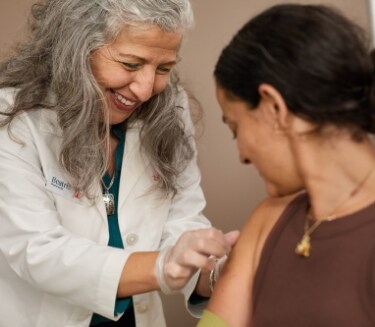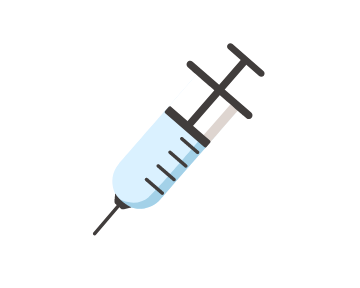
*No cost to you with most insurance. Vaccines subject to availability.
State-, age- and health-related restrictions may apply.

Schedule a FREE flu shot with your neighborhood pharmacy team.*

*No cost to you with most insurance. Vaccines subject to availability.
State-, age- and health-related restrictions may apply.



Did you know the CDC says you can get more than one vaccine at the same time? Save time and stay up to date with your routine vaccinations, like RSV, pneumococcal and more.



Under the weather and not sure if you have the flu or COVID-19? Get tested and find the right relief to help you feel better.
View each tile to learn more




A flu vaccine is needed every year for two reasons. First, a person’s immune protection from vaccination declines over time, so an annual flu vaccine is needed for optimal protection.
Second, because flu viruses are constantly changing, the composition of flu vaccines is reviewed annually and updated to protect against the viruses that research indicates will be most common during the upcoming flu season. For the best protection, everyone 6 months and older should get vaccinated annually. Walgreens can vaccinate everyone 3+.
Get the facts about the flu Can the flu shot make me sick?No, flu vaccines cannot cause flu illness. Some people report having mild side effects after flu vaccination, such as:
To help ease the pain and avoid the symptoms, you can take a pain reliever like Tylenol or ibuprofen for muscle aches, headaches and a low-grade fever.
For arm pain, apply a cool compress and keep your arm moving after the shot.
Get the facts about the flu Can I get a flu shot if I’m pregnant, diabetic, or have chronic illnesses?It’s especially important for certain people to get vaccinated, such as those who are at high risk of developing serious complications like pneumonia if they get sick with the flu. This includes:
The flu can be a serious disease. Any flu infection can carry a risk of serious complications, hospitalization or death, even among otherwise healthy individuals.
Our dedicated pharmacists are here for you if you have any questions related to receiving vaccinations.
Get the facts about the flu Can I get a flu shot and other vaccinesYes, you can get a flu vaccine and other vaccines at the same time, per the CDC. Save time and get your flu shot along with other vaccines like pneumococcal, shingles and RSV (if you’re eligible).
Not sure which vaccines you need? Your pharmacist can help you decide what is best for you.
Get your flu shot or any vaccine and
get a coupon for 20% off
your next purchase of $20 or more up to $100 as a myWalgreens ® member*
Get your flu shot or any vaccine and
get a coupon for 20% off
your next purchase of $20 or more up to $100 as a myWalgreens ® member*
Important flu information from healthcare professionals and pharmacists.

Opens a simulated dialog.
Do you need to get the flu shot every year?

Opens a simulated dialog.
High-dose flu shots for seniors

Opens a simulated dialog.
What To Know About the Flu Shot
Fast Facts With Walgreens
The flu (influenza) is a contagious respiratory illness caused by influenza viruses. It can cause mild to severe illness, and at times can lead to death. The flu is different from a cold. The flu usually comes on suddenly. People who have the flu often experience fever, chills, cough, sore throat, runny or stuffy nose, muscle or body aches, headaches and fatigue (tiredness). Some people may have vomiting and diarrhea, though this is more common in children than adults. Some people, such as people age 65+, young children and those with certain health conditions, are at high risk for serious flu complications. The best way to prevent the flu is by getting vaccinated each year with a flu shot.
The “flu shot” is a vaccine that protects you from the flu virus. It is inactivated, which means it contains a killed version of the virus, so it cannot cause disease, and is most commonly given as an injection (with a needle) in the arm. This season’s vaccine protects against four influenza viruses that research indicates will be most common during the season. This includes an influenza A (H1N1) virus, an influenza A (H3N2) virus and 2 influenza B viruses. The vaccine takes effect approximately two weeks after it has been administered as antibodies (substances in the blood that protect against infection) accumulate and provide protection against influenza. Therefore, it is important to get a flu shot before the flu begins to circulate in your area, as you may be susceptible to influenza during the two weeks after your flu shot. The flu shot will not 100% eliminate the risk of getting the flu as there are several strains of viruses that can cause the flu. However, data suggests flu symptoms may be milder and complications can be reduced following vaccination. It can also protect others who are vulnerable but may not be able to receive the vaccine for a variety of reasons.
Certain individuals should not be vaccinated without first consulting a healthcare professional. These patients include:
Adults age 65+ have a higher risk for developing complications from the flu and account for more than 60% of the flu-related hospitalizations each year. Recent studies show that people age 65+ may not respond as well to standard-dose flu shots because they do not produce as high of an antibody response following vaccination as do younger people. People with low antibody levels may be at higher risk of catching the flu. While adults age 65+ may receive a standard flu shot, there are vaccines designed specifically for patients age 65+ that work by improving the production of antibodies in order to provide a stronger immune response to the flu than traditional vaccines. Like the standard flu shot, these vaccines are given as an injection in the arm and the side effects are similar, though some patients may experience increased pain, redness or swelling around the injection site compared to standard-dose flu vaccines.
The CDC recommends that people get the flu shot before the flu is widespread by late fall. The peak flu season is typically October to March in the U.S., but people should receive their vaccine as long as the virus is circulating. People should get their flu shot every flu season to ensure the best protection from the flu for themselves and others.
If these side effects occur, they begin soon after the shot and usually last 1 to 2 days. Over-the-counter products may be recommended to manage minor side effects. Most people who receive influenza vaccine have no serious problems from it.
All Walgreens retail locations administer the flu shot. Schedule an appointment ›Our licensed pharmacists, pharmacy interns and trained technicians administer flu shots in all Walgreens pharmacies. Visit your local Walgreens to speak with a pharmacist and to get your flu shot today.